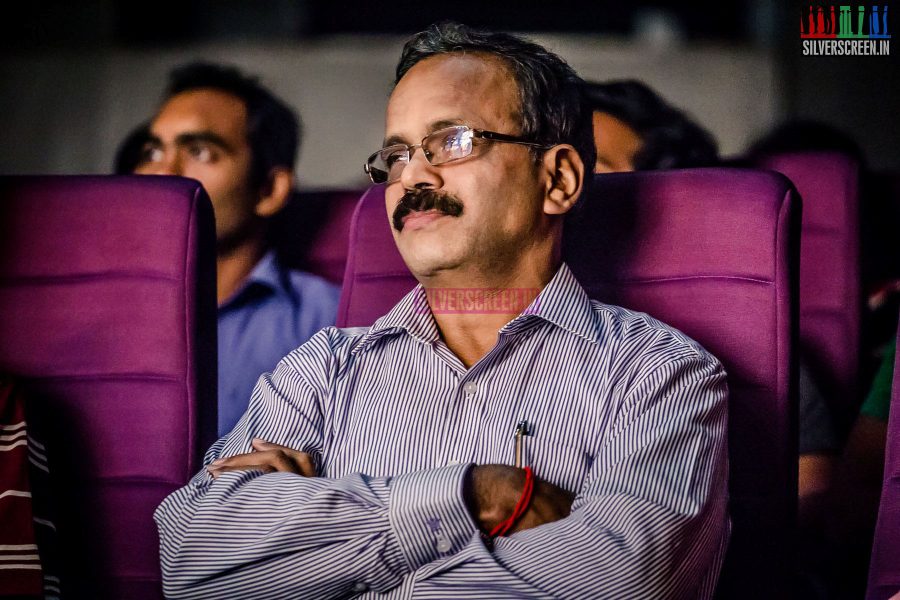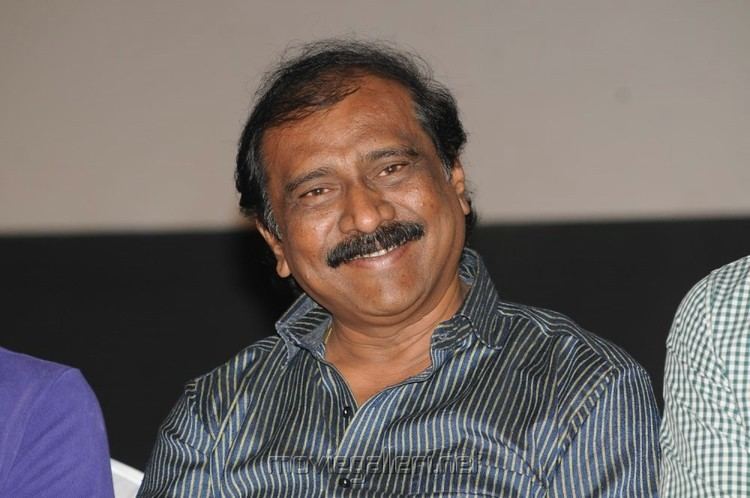Director: Athiyan Athirai
Cast: Dinesh, Anandhi, Munishkanth
In the run up to the release of Athiyan Athirai’s debut film, Irandam Ulagaporin Kadaisi Gundu aka Gundu, interesting posters were released by the production house, Pa Ranjith‘s Neelam Productions. They featured lorry drivers and iron scrap workers, either just the image or with a quote accompanying . One was just the feet of one of the workers but with a missing toe. Another talked about their trust even in iron that’s rusted. It could be a pun. It can also be read as a comment on the strength of their belief, something that will never rust away. Another was about their hard work, the same hard work that doesn’t guarantee security to their life. In Gundu, ‘Attakathi’ Dinesh plays Selvam, a lorry driver working in a scrapyard. He and his friends toil hard by day, lifting the metal waste of the city, and drive them far and wide at night to earn some money — the value equivalent to scrap. So, he demands higher wages from his boss, in an alcoholic trance — a scene beautifully written and choreographed (directed seems so puny a word) — threatens that he’ll form a union for him and his workers. For they are treated like scrap themselves. No thanks to their caste, their position in the hierarchy. There are multiple instances in the film where there are mentions of “sending money home”. Like the scrap that travels, they too have been displaced for the sake of their family. Another yard owner talks of employing people from Orissa. Displacement and the plight of laborers and the working class is a constant presence in Gundu.
The intelligence in the script is how all these ideas and characters involved are brought together with the help of a bomb, another refuse from the last World War, that gets… displaced. A host of people are after it — the police, a corrupt industry-politics nexus, a bahujan investigative journalist working to out the nexus, and inadvertently, Selvam and his lover Chitra (Anandhi). Gundu is an anti-caste film disguised as an anti-war road film. For it intends to highlight that our country’s primary antagonist is caste, and its annihilation is paramount. The bomb is believed to be a relic of the past that father time might have caused to become benign. It’s an untruth that is trotted upon us every single day. But Athiyan Athirai keeps reminding us about the kind of catastrophe that this bomb can cause, and how its damage will be felt by generations to come. We get mentions of Hiroshima and Nagasaki, but they are purely metaphorical, for a bomb washed ashore in Mahabalipuram cannot be nuclear in the strictest sense. But when we hear about the possible effects of this bomb, we know that Gundu is not really talking about a bomb, it is merely a framing device for a more devastating problem. There is a scene where a bomb actually goes off (not a spoiler), and it is interesting what Athiyan Athiran chooses to show. He shows recognisable landmarks being blown to smithereens, but he also foregrounds religious institutions exploding to dust — temples, mosques and churches. In that moment, it is apparent that there is more to Gundu than it lets on.
Irandam Ulagaporin Kadaisi Gundu explodes with energy in every scene and dialog, even the comedy from Munishkanth — who can get on our nerves at the nerviest of moments — reflects a structural issue in our society. It’s not there to take your mind away, it exists to feed it. He plays the snitch in the scrapyard, who tells on the lowly workers to his boss. He is called Puncture, lovingly and disparagingly, but he is full of hot air himself. See, nothing in this film is what it seems. Taking a trip with Selvam and the bomb, Puncture applies patches to his own prejudice. But once he is transformed, Puncure begins to refer to Selvam as his “guruji”. From then on, not a sentence spoken to Selvam misses that word. Athiyan wants to highlight something foundational in our society — the prevalence and insistence on a hierarchy. If someone superior is knocked off their perch, there is always a new one to replace him or her. All animals are equal, but some animals are more equal than others, as Orwell put it. Gundu is structured like Animal Farm, like reality that’s conditioned into us, Athiyan seems to suggest through Puncture’s comedy. He also manages tonal leaps, from the road movie to the love story to the cat and mouse chase, with aplomb. We learn about Selvam’s father in a montage, but it soon gives us snapshots of his love story with Chitra, about his town, his family vis-à-vis Chitra’s upper-caste family. A family that resorts to caste violence after the final straw to safeguard their status. Athiyan Athirai and Neelam Productions are not ones to shy away from the iconography of our state — they show a popular party’s symbol painted on the walls of her house. The iconography is further reflected in the way a search is visualised. With song, dance and drama set to Tenma’s thumping score. It is filmed by combining a therukoothu where the evil is vanquished with moments of Chitra staging a grand opera, and Selvam and Puncture finding that the bomb has morphed into an idol of worship. They set about this search because it disappeared thanks to an age-old religious custom. It’s plain and clear to the eyes what Athiyan is indicting here, and he is spot on.
Recommended
Gundu is one of the cleverest scripts from Tamil cinema this year. It winks its way through a story that is designed as a ticking bomb screenplay, and we get all the genre staples like the chasing, the hiding, the separating and uniting. It wants to establish that empathy will save the world with its bunch of thozhars (comrades), like the journalist played by Rythvika, her friends and well-wishers in their brigade, like Selvam and Chitra themselves. The German woman who finds the bomb in the shore remarks, “Our country was war-torn and therefore we find bombs all the time. But it is a mystery that it appeared in your land, where there was no war.” Our war is against a different beast and the oldest of them all, Athiyan Athirai wants to say, and there is only one way to solve it.
The Gundu review is a Silverscreen.in original article. It was not paid for or commissioned by anyone associated with the film. Silverscreen.in and its writers do not have any commercial relationship with movies that are reviewed on the site.



